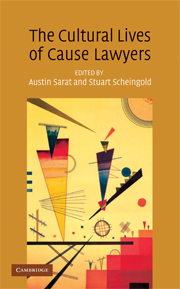Book contents
- Frontmatter
- Contents
- Acknowledgments
- Contributors
- Bringing Cultural Analysis to the Study of Cause Lawyers: An Introduction
- PART I THE CULTURAL WORK OF CAUSE LAWYERS
- PART II THE CULTURAL CONSTRUCTION OF LAWYERS AND THEIR CAUSES
- 4 “They all have different policies, so of course they have to give different news”: Images of Human Rights Lawyers in the British Press
- 5 Ed Fagan and the Ethics of Causes: Who Stole Identity Politics?
- 6 Of Windmills and Wetlands: The Press and the Romance of Property Rights
- 7 “The Kids are Alright”: Cause Lawyering on Television in 1960s America
- 8 Nothing to Believe In – Lawyers in Contemporary Films About Public Interest Litigation
- 9 “Of course he just stood there; he's the law”: Two Depictions of Cause Lawyers in Post-Authoritarian Chile
- 10 Paulina Escobar as Cause Lawyer: “Litigating” Human Rights in the Shadows of Death and the Maiden
- PART III THE CULTURAL RECEPTION OF LAWYERS AND THEIR CAUSES
- Index
9 - “Of course he just stood there; he's the law”: Two Depictions of Cause Lawyers in Post-Authoritarian Chile
Published online by Cambridge University Press: 08 January 2010
- Frontmatter
- Contents
- Acknowledgments
- Contributors
- Bringing Cultural Analysis to the Study of Cause Lawyers: An Introduction
- PART I THE CULTURAL WORK OF CAUSE LAWYERS
- PART II THE CULTURAL CONSTRUCTION OF LAWYERS AND THEIR CAUSES
- 4 “They all have different policies, so of course they have to give different news”: Images of Human Rights Lawyers in the British Press
- 5 Ed Fagan and the Ethics of Causes: Who Stole Identity Politics?
- 6 Of Windmills and Wetlands: The Press and the Romance of Property Rights
- 7 “The Kids are Alright”: Cause Lawyering on Television in 1960s America
- 8 Nothing to Believe In – Lawyers in Contemporary Films About Public Interest Litigation
- 9 “Of course he just stood there; he's the law”: Two Depictions of Cause Lawyers in Post-Authoritarian Chile
- 10 Paulina Escobar as Cause Lawyer: “Litigating” Human Rights in the Shadows of Death and the Maiden
- PART III THE CULTURAL RECEPTION OF LAWYERS AND THEIR CAUSES
- Index
Summary
“Of course he just stood there, he's the law.”
– Paulina Lorca, Death and the MaidenIntroduction
Paulina Lorca's comment about Gerardo Escobar, her husband and a human rights lawyer in Roman Polanski's 1994 film Death and the Maiden, succinctly captures one way that cause lawyers have often been viewed within Chilean popular culture: they just stand there. This essay explores whether this cynical critique of cause lawyers has endured the decade of political upheaval, social transformation, and legal reform that followed Death and the Maiden, using the recently produced Chilean television drama Justicia Para Todos (“Justice for All”) as a vehicle for comparison. In so doing, it focuses on two dilemmas consistently encountered by the cause lawyers in these fictionalized accounts: law vs. social justice and professionalism vs. public service.
This essay begins with a brief review of the legal reforms (primarily in the criminal law field) that followed the end of the Pinochet regime in Chile. It then describes the history of legal culture in Chile. The bulk of the essay analyzes Death and the Maiden and Justicia Para Todos, comparing the ways in which they depict the cause lawyers who figure prominently in the plots of each. The essay concludes with a series of observations about cultural depictions of cause lawyers in post-authoritarian Chile that relate to the overall themes of this book. Throughout, the essay refers to enduring themes of the Cause Lawyering Project that these depictions bring to mind.
- Type
- Chapter
- Information
- The Cultural Lives of Cause Lawyers , pp. 253 - 277Publisher: Cambridge University PressPrint publication year: 2008



